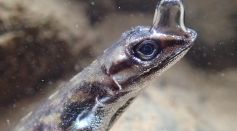ENVIRONMENT & CLIMATE
After 3,000 Years, First Tasmanian Devil Born in Wild Australian Mainland

Costa Rica Water Lizard Uses Bubble Snouts to Scuba Dive in 16 Minutes
NASA's Earth System Observatory to Study How Climate Change Fuels Natural Disasters

Animal, Plant Species Heading Towards Extinction: 25 Percent of 7 Million in Great Danger

California Town Sinks 2 Feet Per Year; Here’s Why Corcoran Slowly Turns Into Sinkhole

Climate Change May Have Caused Major Population Collapse of Amazon Indigenous People 400 Years Before European Arrival
Highly Infectious H5N8 Bird Flu Virus Now in 46 Countries, Can It Be the Next Pandemic? Scientists Who Warn of COVID-19 Sees Possibility
Whitewater River Loud Noise Affects Hunting of Birds While Bats Switch to Echolocation

Clownfish Develop Stripes At Different Rates Depending on How Toxic Their Sea Anemone Hosts
Greenland Ice Sheet Leaking Dangerous Levels of Mercury Into Rivers and Waterways
Newest Icelandic Volcano Hosts Perfect Conditions to Replicate Martian Environment

Trove of Prehistoric Remains Including a Spiked Teeth Monster Salmon Accidentally Found in California

Yuan Longping, the "Father of Hybrid Rice," Dies at 90; Here's How He Changed the World
Unique Plant Produces Odor Similar to Dead Insects Attracting, Trapping Coffin Flies
Most Popular

Ocean Acidification, Marine pH Change, and CO2 Absorption: How Coral Reef Damage and Shellfish and Plankton Impacts Threaten Marine Life

Dark Matter Explained: What We Know, What We Don't, and How It Shapes Cosmic Structure

Memory and Learning: How the Brain Stores, Retrieves, and Forgets Information

Solar Storm Risks: How Geomagnetic Storms Threaten Earth's Power Grids and Satellites




